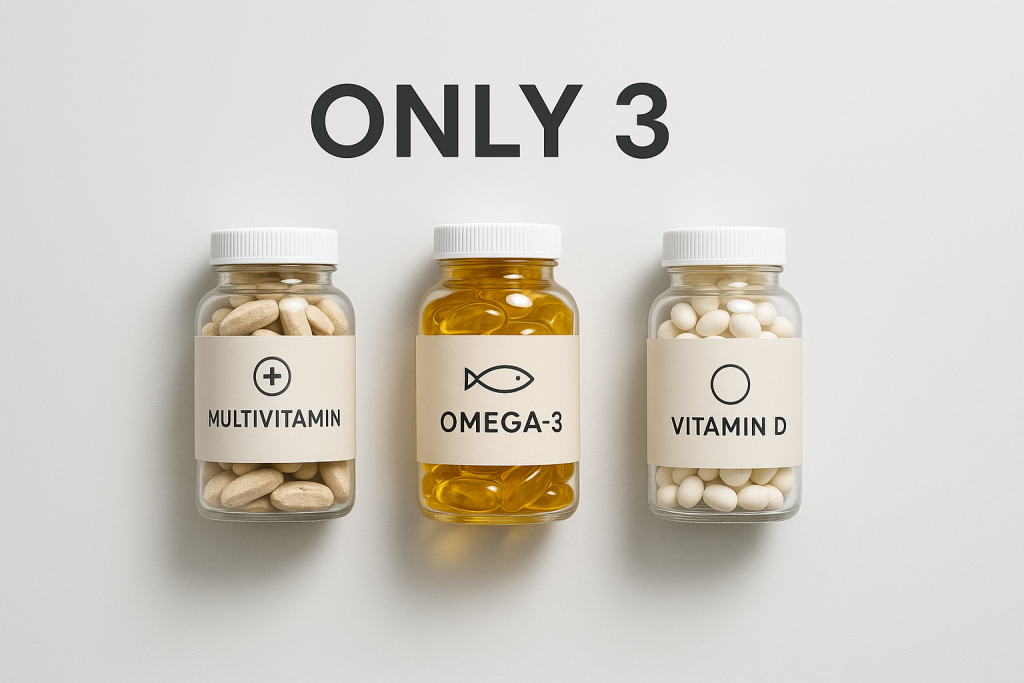
Walk into any supplement store, and you’ll be bombarded with a dizzying array of powders, pills, and potions promising everything from Herculean strength to instant fat loss. The supplement industry is a multi-billion dollar behemoth built on marketing hype and our desire for a quick fix. I’ve wasted hundreds of dollars on bottles that did nothing but turn my urine expensive.
After wading through the nonsense and focusing on robust, scientific evidence, I’ve narrowed it down to just three supplements that are truly beneficial for the vast majority of people, assuming a generally healthy diet. Forget the proprietary blends and the miracle cures; here are the only three that earn a permanent spot in my cabinet.
1. Vitamin D3: The Sunshine Vitamin
Often called a hormone rather than a vitamin, Vitamin D is crucial for bone health, immune function, and mood regulation. Our primary source is sunlight, but modern life (indoors, sunscreen, northern latitudes) means deficiency is rampant.
The Science: A massive review of studies published in The BMJ found that Vitamin D supplementation reduced the risk of acute respiratory infections. Furthermore, it’s essential for calcium absorption. Low levels are linked to fatigue, low mood, and poor bone density.
Who Needs It: Almost everyone, especially those who live in cloudy climates, have office jobs, or have darker skin (which produces less Vitamin D from sunlight).
My Protocol: 2,000 – 4,000 IU of Vitamin D3 daily, taken with a meal containing fat for better absorption. It’s best to get your levels tested by a doctor for a personalized dose.
2. Omega-3s (Fish Oil): The Inflammation Manager
Omega-3 fatty acids, specifically EPA and DHA, are essential fats our bodies cannot produce. They are powerful anti-inflammatories, support brain health, and are critical for heart function.
The Science: Numerous studies, including those cited by the American Heart Association, link omega-3 consumption to reduced triglycerides, lower blood pressure, and a decreased risk of cardiovascular events. They also play a vital role in cognitive function and mental well-being.
Who Needs It: Unless you’re eating 2-3 servings of fatty fish (like salmon, mackerel, or sardines) per week, you are likely not getting enough.
My Protocol: A high-quality fish oil supplement that provides at least 1,000 mg of combined EPA and DHA per day. Look for brands that are third-party tested for purity (to be free of heavy metals like mercury).
3. Magnesium: The Relaxation Mineral
Magnesium is involved in over 300 biochemical reactions in the body, including muscle and nerve function, blood sugar control, and blood pressure regulation. It’s a natural relaxant.
The Science: Modern farming practices have depleted magnesium in the soil, and our diets are often deficient. Studies show that magnesium supplementation can improve sleep quality, reduce muscle cramps, and help alleviate symptoms of anxiety and depression.
Who Needs It: People experiencing poor sleep, muscle twitches, or high stress levels. It’s also crucial for anyone who exercises intensely, as magnesium is lost through sweat.
My Protocol: 200-400 mg of Magnesium Glycinate or Citrate about 30-60 minutes before bed. The glycinate form is particularly good for sleep as it’s gentle on the stomach.
The Honorable Mention: Protein Powder
This isn’t a vitamin or mineral, but a food. If you struggle to hit your daily protein target through whole foods alone, a high-quality whey, casein, or plant-based protein powder is a convenient and effective tool. It’s a supplement to your diet, not a magic muscle-builder.
The bottom line? No supplement can replace a balanced diet, quality sleep, and regular exercise. But these three—Vitamin D, Omega-3s, and Magnesium—fill critical, common nutritional gaps with a strong backing of scientific evidence.
